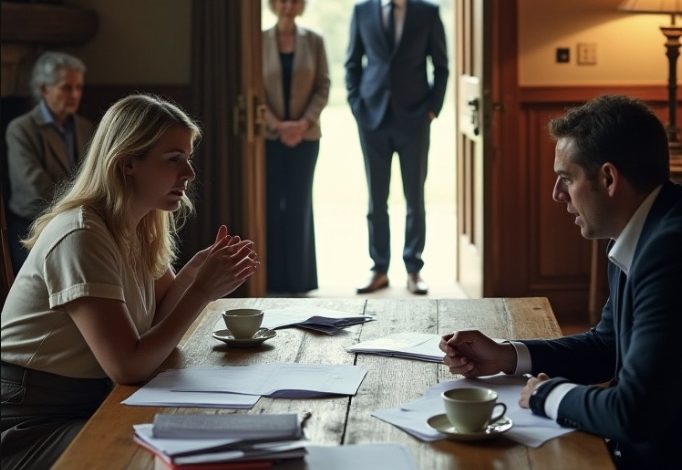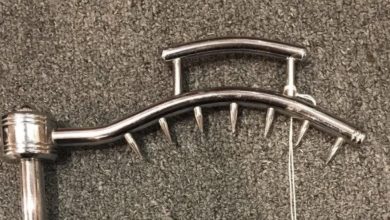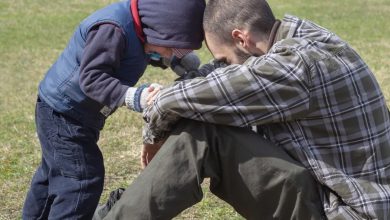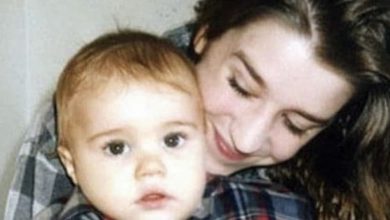“Power of Attorney, Family Pressure, and a Porch That Wouldn’t Budge—The Day Hattie Mae Reclaimed Her House and Her Voice”

My daughter-in-law thought she could ship me off and take the house I built. “She’s too old to fight back,” she whispered. What she didn’t know was that my granddaughter had a plan—and the lawyer she brought was the one man my son has dreaded for years.
My name is Hattie Mae Johnson. I’m seventy-nine years old, and this place I live in isn’t just a house. It is my history. It is my proof. Every board, every nail, every patch of paint came from my hands and my stubborn heart. People see four walls and a roof. I see my life.
I didn’t get this home by luck. I was a young widow before I turned thirty. My husband passed sudden and hard, and it was just me and my baby boy, Reggie. Bills piled up like storm clouds. There was no one to fix the roof when it leaked or to lay a new floor when the old one buckled. So I learned. I learned to swing a hammer, hang drywall, pour a small slab, set a window square, and keep the heat in during winter. If I didn’t know how to do it, I stood over someone who did and watched until I could. Folks told me a woman had no business on a ladder with a tool belt. I told them hunger had no manners either.
I cleaned houses, picked produce, sewed dresses by lamplight, and saved every dollar till my fingers ached and my eyes burned. When a church down the road was torn down, I asked for the old bricks. I stacked them in the yard and cleaned the mortar off with a chisel one by one. That’s what you’re standing on when you step onto my porch—the bricks I saved from being thrown away. That is how I built a life: piece by piece, with what others left behind.
Then Reggie grew up. He was quiet and soft-spoken, the kind of boy who avoided trouble when he could—but trouble still found him now and then. He married Carlen, and that woman came into this family like she was walking through a showroom. From the first day she visited, she lifted her chin and looked around as if she was judging how much the furniture was worth. Her hands were always clean, her nails always perfect. She talked like everything needed “upgrading.” I felt the wind change the day she crossed my porch.
It started with comments that sounded kind on the surface and cold underneath.
“Oh, Mama Hattie, this kitchen has so much… character,” she said, touching my old counter—the same counter where I rolled biscuit dough for half the church. “Of course, they don’t build them like this anymore.”
Or, “We’ve been visiting those new senior communities, Mama Hattie. They have water aerobics and heated floors. You wouldn’t have to worry about anything.”
The smile on her face never reached her eyes.
I ignored it at first. I told myself she was nervous and trying too hard. But the notes of her voice got sharper. She moved from comments to plans. “What if we updated the place a little? Knock down this wall. Replace those windows. Refinish the floors. It would raise the value for all of us.” For all of us, she said, like my home was already a split pie and not a whole loaf.
The day everything came to a point was a Tuesday that felt like a Sunday—too quiet, air heavy, a drip in the kitchen sink keeping time: drip, drip, drip. Reggie and Carlen arrived dressed neat like they were going to a meeting. Their smiles were stiff.
“Mama Hattie,” Carlen began, sugar melting on the edges of her voice, “Reggie and I have been talking. We love you, and we think it’s time to consider what’s best for you in your golden years.”
She laid a thick stack of papers on the table. “Just a formality,” she said, tapping the top page with a perfect nail. “A power of attorney. So we can help you if anything happens.”
I didn’t touch the stack. I sat in my rocker and watched it like a snake coiled in the sun.
They moved into the kitchen and thought I couldn’t hear through old walls. But these ears have listened to storms and babies and lies long enough to know the truth in a whisper.
“She doesn’t even know what she’s signing,” Carlen hissed. “One signature, Reggie, and we can get her into Maple Street Senior and put this property on the market. She’ll be comfortable, and we can finally do something with this place.”
Do something. As if I had done nothing all these years but rock and breathe.
They didn’t stop with papers. A week later I caught a chest cold that wouldn’t quit. The clinic sent me to the hospital “to be safe.” I woke with an IV in my arm and a nurse telling me to rest. Carlen stood at the foot of the bed, hand on her heart, and told the doctor I was “confused at times” and needed close supervision. After that, the pills kept coming on schedule: one to calm me, one to help me sleep, one “for the cough.” My head felt stuffed with cotton. My tongue was thick. Words kept slipping away before I could build a sentence. It was like being put behind a pane of glass where I could see the room but not touch it.
While I lay there heavy and slow, they went to work. I heard them in the hallway, voices low. I heard the words “notary,” “title,” and “transfer.” I saw cardboard boxes with my name on the side. I smelled my own furniture polish, the lemon kind I’ve used for forty years. They were packing my things like I had died.
That should have been the end of me. But the Lord sends help in plain packages. Mine came in the shape of my granddaughter, Kesha.
Kesha is twenty-six and fierce as summer heat. She calls me every day and visits more than anyone. When others bring empty talk, she brings cornbread wrapped in a towel, a jar of soup, a wildflower in a soda bottle. She sat by my bed and rubbed lotion into my hands while the machines beeped steady. She noticed things—how the nurse chart said “disoriented,” how the pill cup always arrived just as I woke, how Carlen asked too many questions about discharge dates.
One afternoon Kesha stepped into the hallway for water and heard two voices around the corner: Reggie’s and Carlen’s.
“As soon as she signs, we file the new deed,” Carlen whispered. “Then we list. That roof alone will eat us alive if we don’t move fast.”
“What if she refuses?” Reggie asked, voice small.
“She won’t. She thinks the hospital has her best interest. Besides, once the notary comes while she’s ‘resting,’ we’ll be done.”
Kesha told me later that she stood there shaking, not with fear but with anger that made her jaw ache. She didn’t come back to my room right away. She took a bus to the county building and went straight to the records office. She sat for hours with dusty books and a little magnifying lens the clerk loaned her. She read line after line until she found what she needed.
The deed to my home was recorded in my name alone, with a provision I had added years back when a church friend warned me to protect myself: a life estate. It said I had the right to live here until the day I pass, no matter who tries what. Any sale without my consent would be void. And the so-called “new deed” Reggie and Carlen tried to file? It had no notarized signature from me and no legal power.
Kesha took photos with her phone. She asked for certified copies. Then she called a lawyer I’d heard about for years—Attorney Marcus Hale. He used to work for the state as a tough investigator and later as a private lawyer. When Reggie was younger and running with a bad crowd, Hale had been the one to drag him into court for unpaid fines and code violations at a car lot he tried to open without the proper permits. Ever since then, my son has gone pale at the sound of the name. That’s the man Kesha called.
“Ms. Johnson,” Hale said when he met her, “I know who your family is. I know who you are. Tell me what’s going on.”
Kesha laid everything on his desk—the copies, the hospital notes, even a video she had recorded in the hallway where Carlen said “sign” and “list.” He didn’t smile. He didn’t frown. He just started writing.
That evening Kesha came back to the hospital and bent close to my ear. “Grandma,” she whispered, “they can’t take what you didn’t give them. The deed protects you. And I found a lawyer—Marcus Hale. The one Reggie hates.”
A small spark flared inside me—the oldest spark I own. “Baby,” I rasped, “help me up. Get me out of here.”
Kesha squeezed my hand. “I was waiting for you to say that.”
The next morning Hale arrived with a clipboard and two forms. One revoked any “medical proxy” Reggie had tried to claim. The other requested immediate review of my medications and discharge to my own home with a named caregiver—Kesha. Hale stood in the hallway and spoke in a voice that was quiet but sharp as a blade. “Either honor Ms. Johnson’s rights today, or we will be in front of a judge by dinner.”
Three hours later I was in Kesha’s car with a wool blanket around my shoulders and a bag of my clothes in my lap. The fall sunlight hit my face like a blessing.
We didn’t go straight home. First we stopped at Hale’s office. He had already filed a temporary restraining order against any sale, recorded a notice at the county that flagged my title, and drafted letters to Reggie and Carlen ordering them to stop acting on my behalf. “If they set one toe on your porch to pressure you,” he said, sliding the papers into a folder with my name, “we call the sheriff.”
From there we drove to my house. The smell met me at the door—floor polish and coffee and something faintly sweet from the lilacs outside. My hands shook when I touched the front wall. “Still mine,” I whispered. The boards were cool under my palm. “Still mine.”
We changed the locks that afternoon. Kesha stood on a small ladder with a screwdriver while I held the box of hardware. “Lefty loosey, righty tighty,” she joked, and I laughed—a small broken laugh that turned into a real one. We set up a door camera and put Hale’s letter in a clear sleeve right by the bell.
Hale came by that evening and sat at my kitchen table with a yellow pad. “Let’s make a plan,” he said. Simple words. My kind of words.
We made three lists:
Protect the house. Title alert filed. Locks changed. Camera installed. Utilities in my name only. Insurance updated.
Protect Hattie. New medical directive that names Kesha, not Reggie, to speak for me if I ever can’t. A durable power of attorney—to Kesha—limited to paying bills and maintaining the property if I become unable, nothing more.
Confront the problem. Invite them to talk—with witnesses. Keep everything on the record.
Two days later Kesha called Reggie and Carlen. “Grandma wants to see you,” she said. “Come by Saturday at two.” She did not mention that Attorney Hale would be sitting at the table, calm and ready.
They showed up dressed like they were visiting a bank manager. Carlen’s smile was thin as paper. Reggie’s eyes kept sliding to the new lock and the door camera.
I sat in my rocker with a shawl over my shoulders. Hale sat at the table with his legal pad. Kesha stood behind me, one hand on the chair.
Carlen started with a performance. “Mama Hattie, we were so worried! We only wanted what’s best. That house is old. You need care. We—”
Hale raised one finger. “Mrs. Johnson will speak. Then you will.”
Silence fell. I stood up slowly. My legs wobbled but held. “You called my home an upgrade project,” I said. “You told a doctor I was confused, and you tried to file a deed that didn’t have my signature. You did those things while I was sick.”
Carlen’s mouth opened and closed. Reggie stared at the table.
Hale slid copies across the wood. “Here is the life-estate deed. Here is the attempted filing without notarization. Here is the audio of you saying, ‘Once she signs we list the property.’ That is fraud. If you step one inch toward selling or moving Ms. Johnson again, we go to court for elder exploitation. The sheriff knows about this.”
Carlen lost the last of her color. “You can’t prove—”
“We can,” Hale said. His voice didn’t rise. It didn’t need to. “And your husband knows we can, because he remembers who I am.”
Reggie finally looked up, and there it was—the dread I remembered from years ago, when Hale forced him to clean up that illegal car lot. “Mama,” he said, soft and flat, “we were scared about money. The roof. The taxes. We thought—”
“You thought about yourselves,” I said. “Not me.”
Silence again. The clock ticked. Somewhere outside, a dog barked twice.
Hale pushed another document forward. “Here is a solution that keeps Ms. Johnson safe and ends this today. You will sign a consent order agreeing that you have no authority over her finances, health decisions, or property. You will return any items removed from the house within ten days or pay their value. You will not enter this property without her written invite. Violate it once, and we file criminal charges. Do you understand?”
Carlen looked at Reggie. Reggie looked at me. I just stood there, steady as I could be. They signed.
When they left, Carlen paused on the steps. “Mama Hattie,” she said, voice shaking now for real, “I’m… I’m sorry.”
I didn’t answer right away. I let the wind move through the oak tree and the old porch boards creak under her heels. Then I said, “I don’t hate you. But I don’t trust you. Time will decide if that changes. Not your words.”
She nodded and went to the car. Reggie followed, head low.
The days after that were quiet, the kind of quiet that feels like a blessing. Kesha drove me to the hardware store for paint samples. We patched a soft spot in the back steps and replaced a flickering light in the hallway. Neighbors stopped by with pound cake and hugs and wide eyes—they had heard something had gone down and wanted to make sure I was all right. I told them the truth in simple words: “I’m home.”
Hale came by once more with final papers. “Everything’s recorded,” he said. “You’re protected.” He looked around my kitchen with its scuffed floor and bright curtains. “Ms. Johnson, not all fights are loud. You did the hard part when you decided to stand up.”
I thanked him. When he left, I told Kesha we needed to do one more thing. We took out a small fireproof box and put inside the life-estate deed, my new directives, the consent order, and a letter I wrote in a careful hand. The letter started, If anyone ever tells you I gave up this house, don’t you believe them. Here is the proof. We tucked the box under the bed where I can reach it.
A week later, I woke early and made hot tea. I carried my cup to the porch and sat in my chair while the sky turned pink. I looked at the bricks under my feet. I thought of the church they once were and the hands that first laid them. I thought of the years they spent forgotten in a pile, and the hours I spent scraping the mortar free. Those bricks were given a second life on my porch. People forget that old things can be the strongest things—if they’re cared for.
Kesha came out and sat beside me. “You doing okay, Grandma?”
“I am,” I said. “I’m tired, but I’m standing.”
She smiled wide. “I like seeing you stand.”
I took her hand. “Baby, one day this house will be yours if you want it. Not because somebody tricked me, but because I say so. Not now. Not yet. But when the time comes, I want someone who loves it to hear the boards creak and know the stories.”
She squeezed my fingers. “I’ll learn every creak.”
We sat quietly. A blue jay scolded a squirrel in the oak. A mail truck rumbled past. Life moved forward the way it always does—simple, steady.
People ask me now and then if I’m angry. I’m not. Hurt, yes. A hurt from your own family cuts in a place strangers can’t reach. But I won’t let bitterness live here. This house has held enough storms. It deserves calm.
I learned something worth keeping: you don’t have to shout to defend what you love. Sometimes you just need a granddaughter with fire, a lawyer who knows the law, and the courage to say one clear word: No.
So that’s my story. I’m Hattie Mae Johnson. I’m seventy-nine. I built this house. I’m still in it. And if anyone thinks I’m too old to fight, they can come try the door—right after they read the sign beside the bell with Attorney Marcus Hale’s number on it.
I’ll be here on the porch, rocking slow, watching the light change on the bricks I saved. The house stands. I stand. And that, honey, is the end of it—and the beginning, too.










